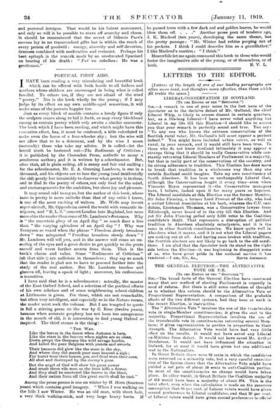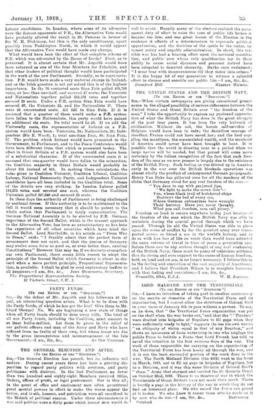THE GENERAL ELECTION.—THE A . LTERNATIVE VOTE OR P.R.
[To PRE EDITOR OP TEE SPECTATOR '')
Sus,—The broad facts of the General Election have convinced many that our method of electing Parliament is urgently in need of reform. But there is still scone confusion of thought as to whether this reform should be the Alternative Vote or Proportional Representation. A comparison of the probable effects of the two different systems, had they bees at work in the recent Election, is instructive.
The "Alternative Vote" involves the use of the transferable vote in single-Member constituencies; it gives the eeat to the majority. Proportional Representation involves the use of the transferable vets in constituencies returning several Rem. bees; it gives representation to parties in proportion to their strength. The Alternative Vote would have had very little effect on the reunite. It would not have saved any Liberal ex-Minister from defeat. It would not hare saved Mr. Arthur Henderson. It would not have. influenced the situation in Ireland, for at most it would have given but one additional seat to the Nationalists.
In Great Britain there were 92 seats in whioh the candidates were returned on a minority vote, but a very careful examina- tion of the figures shows that the Alternative Vets might have yielded a net gain of about 20 seats to anti-Coalilion parties. In most of the constituencies no change would have taken place. in other words, in Great Britain the Coalition majority of 414 would have been a majority of about 374. This is the total effect, even when the calculation is made on the generous assumption that 60 per cent. of Labour voters would have given second preferences to Liberal candidates, and that 20 per cent. of Liberal voters would have given sewed preferences to official Labour candidates. In London, where 60018 of its advocates were the fiercest opponents of P.R., the Alternative Vote would have probably altered the result in St. Pancras in favour of Sir W. H. Dickinson, but this is the only constituency, apart possibly from Paddington North, in which it would appear that the Alternative Vote would have made any change.
What would have been the effect of that complete scheme of P.R. which was advocated by the House of Lords? First, as to personnel. It is almost certain that Mr. Asquith would have been returned aa one of the four Members for Fifeshire, and that other leaders of political thought would have participated in the work of the new Parliament. Secondly, as to representa- tion. P.R. would have made a very material change in Ireland, and as the Irish question is not yet solved this is of the highest importance. In the 76 contested seats Sinn Fein polled 495,760 votes, or less than one-half, and secured 47 seats; the Unionists and Nationalists together polled 615,578 votes and together secured 29 seats. Under a P.R. system Sinn Fein would have secured 87, the Unionists 22, and the Nationalists 17. There were 25 uncontested seats. All felt to Sinn Fein. If it assumed that a quarter of these would under a P.R. system have fallen to the Nationalists, this party would have gained an additional six seats. Its total would he 23. If we add the University seats, the representation of Ireland on a P.R. system would have been; Unionists, 24; Nationaliets, Z; Inde- pendent (Sir R. Wood). 1; total non-Sinn Fein, 48; Sinn Fain. 57. The problem which Ireland would have presented to the Government, to Parliament, and to the Peace Conference would have been different from that which is presented to-clay. The effect in Great Britain of a P.R. system would also have been of a substantial oharacter. If of the unoonteeted seats it is assumed that one-quarter would have fallen to the minorities, the Coalition majority in Great Britain would probably be about 114 instead of 414. In making these calculations the votes given to Coalition Unionist, Coalition Liberal, Coalition Labour, National Democratic Party, and Independent Unionist oandidates have all been inoluded in the Coalition total. Some of the details are very etriking. In London Labour polled 114,275 votes and secured one seat, whereas the Coalition Unionists polled 847,040 and eecured 35 seats.
In these days the authority of Parliament is being challenged by motional forces. If this authority is to be maintained to the full it would seem necessary that it should be patent to the whole nation that Parliament is fairly representative. The German National Assembly is to be elected by P.R. German experience of the Second Ballot, which is the nearest approach to the Alternative Vote, has been as unsatisfactory as has been the experience of all other countries which have tried the Second Ballot. Lord Northcliffe, in his article on "From War to Peace," said, "I frankly admit that the perfect form of government does not exist, and that the genius of Germany may evolve some form as good cm, or even better than, existing Constitutions." However this may be, if we desire to strengthen our own Parliament, there seems little reason to adopt the principle of the Second Ballot which Germany is about to dis- card when a more perfect principle, Proportional Repreeenta- tion, is available. I shall be glad to send explanatory leaflets to



































 Previous page
Previous page